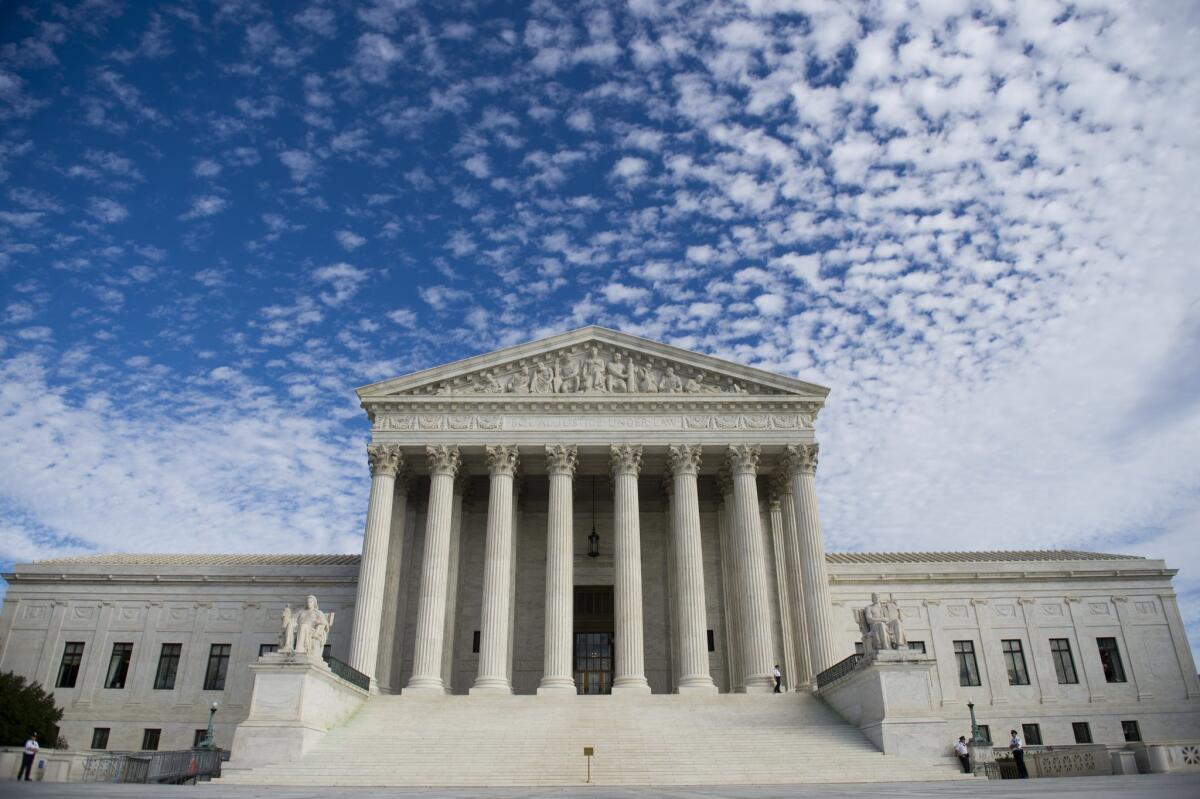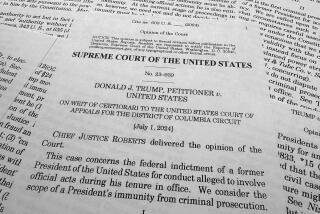Supreme Court saves Obamacare again, rejecting GOP challenge from Texas

- Share via
WASHINGTON — The Supreme Court on Thursday rejected a sweeping challenge to Obamacare pressed by Republican state attorneys and backed by former President Trump, ruling the plaintiffs had no standing to complain about a law imposing penalties on no one.
The decision in California vs. Texas preserves health insurance subsidies for more than 20 million Americans and protections for tens of millions more whose preexisting medical conditions could otherwise prevent them from obtaining coverage.
The Texas suit, the third major effort to strike down the national healthcare law, fizzled out in a 7-2 decision.
And this time, the court did not sharply split along ideological lines.
Two Trump appointees — Justices Brett M. Kavanaugh and Amy Coney Barrett — joined Chief Justice John G. Roberts Jr. and the three liberals in dismissing the Texas suit. Justice Clarence Thomas concurred. Justices Neil M. Gorsuch, also a Trump appointee, and Samuel A. Alito Jr. dissented.
In the ruling — and similarly in a separate unanimous decision Thursday that pitted gay rights against religious liberties — Roberts and his colleagues surprised many by finding a way to bring together those on the right and left, rather than issue the usual 5-4 decision that has often divided the bench on such culture-war cases.
They did so by keeping the decision narrowly focused and not making a broad pronouncement on the law. The justices avoided dealing again with the constitutionality of the 2010 law and instead said simply that the suit should have been dismissed at the start.
Justice Stephen G. Breyer, writing for the court, said neither the state of Texas nor the two men who joined the suit suffered a “concrete, particularized injury” that gave them standing to sue.
Since Congress had reduced the penalty under the law for not having insurance to zero, they could not claim they were being forced by the government to buy insurance they did not want, he said.
The ruling stands as a final thumbs-down verdict against Trump’s promise that he would “repeal and replace” the 2010 Affordable Care Act sponsored by President Obama. Trump never devised a plan to replace the law, and both the Republican-controlled Senate and the high court with a solidly conservative majority rejected his legislative and legal bids to repeal it.
In the past, the court had struggled with the law’s mandate that people who could afford it must buy health insurance. Otherwise, they faced a tax penalty. In 2012, the justices by a 5-4 vote upheld this provision and the entire law on the grounds that Congress had broad power to impose taxes.
But in 2017, the Republican-controlled Congress reset the tax penalty to “$0.” An earlier move to repeal the entire law failed when the late Sen. John McCain (R-Ariz.) famously gave a “thumbs down” vote.
The outcome appeared to end the legal and political fight over Obamacare, since Congress had repealed the one provision that had triggered the most opposition.
But Texas Atty. Gen. Ken Paxton went back to court in 2018 claiming the entire law was unconstitutional because it rested on a mandate that now had no force. He based his argument on statements by leading Democrats prior to 2012 that the mandate was crucial to the success of the law. Democrats later acknowledged that the mandate was not as critical to the program’s success as they once thought.
While Paxton’s suit was derided by legal scholars, he had the backing of 17 other Republican state attorneys. And he won a broad ruling from a federal judge in Fort Worth. A year later, the 5th Circuit Court of Appeals in a 2-1 decision agreed the law was on shaky ground, but did not issue a final ruling.
Because the Trump administration refused to defend the law, then-California Atty. Gen. Xavier Becerra stepped forward to lead the defense, and he had the backing of 20 other Democratic-led states.
They opted to go directly to the Supreme Court. Early last year, the justices voted to take up the case. In September, however, Justice Ruth Bader Ginsburg died, raising fears on the left that the law could be struck down by the newly named Trump appointees.
The fate of Obamacare became a key issue in Barrett’s confirmation hearings last year. Democrats warned she would provide the final vote needed to scrap the law. But Coney signaled skepticism that the latest legal challenge — even if accepted — merited invalidating the entire law.
And conservatives such as Roberts and Thomas have long been skeptical of granting standing to people who sue over laws they do not like.
Alito, who had voted against Obamacare at every opportunity, wrote a long dissent, arguing the law should fall because the mandate is all but gone, and Gorsuch agreed.
Meanwhile, Becerra who led the defense, is now the secretary of Health and Human Services under President Biden and is in charge of administering the law.
More to Read
Get the L.A. Times Politics newsletter
Deeply reported insights into legislation, politics and policy from Sacramento, Washington and beyond. In your inbox twice per week.
You may occasionally receive promotional content from the Los Angeles Times.











